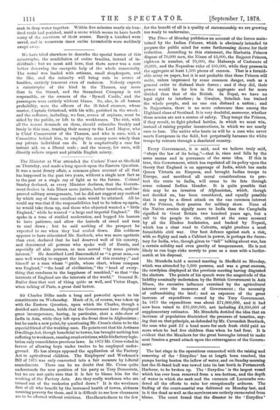The Vines of Monday publishes an account of the forces
main- tained by the Indian Princes, drhich is obviously intended to prepare the public mind for some forthcoming decree for their
statement, the Marhatta Princes this We have tried elsewhere to describe the special horror of this reduction. According to dispose of 70,000 men, the Nizam of 45,000, the Rajpoot Princes, dividuals ; but we must add here, that there never was a case eighteen in number, of 70,000, the Maharaja of Cashmere of better deserving the energetic help of the whole community. 20,000, and the Nepanlese ruler of 100,000, while they possess in the aggregate at least 1,500 pieces of cannon. That is a formid- The vessel was loaded with artisans, small shopkeepers, and able array on paper, but it is not probable that these Princes will the like, and the calamity will bring ruin to scores of a families, entirely innocent even of rashness. Nobody expects unite, unless impressed by some common danger, such as a catastrophe of the kind in the Thames, any more general order to disband their forces ; and if they did, their power would be far less in the aggregate and far more divided than that of the British. In Nepal, we have no legal right to interfere ; in Gwalior, Scindiah has trained the whole people, and no one can disband a nation ; and in Rajpootana, there is no more coherence than among the Highland clans of Scotland. It is very doubtful, moreover, whether these armies are not a source of safety. They tempt the Princes, if they revolt, to fight pitched battles, in which we must win, instead of raising popular insurrections, in which we are nearly sure to lose. The native who beats us will be a man who never meets Europeans in the field, but perpetually harasses the white troops by retreats through a desolated country.






























 Previous page
Previous page